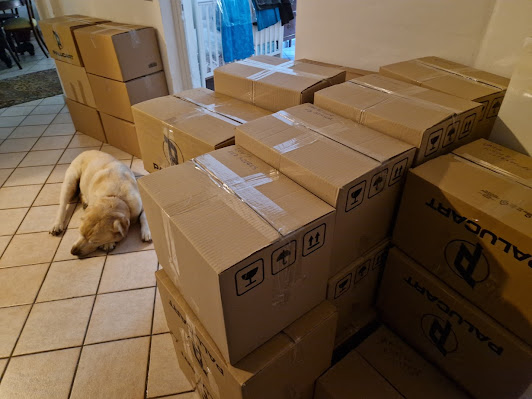“We must drag the chain and ball of our personality to the end. This is the price one pays for the infernal and divine privilege of thought; so in this life it is only the chosen who are convicts—a glorious band which understands and groans but which treads the earth amidst a multitude of phantoms with maniacal gestures and idiotic grimaces. Which would you rather be: idiot or convict?”
– Joseph Conrad, circa 1900, cited in Zdzisław Najder, Joseph Conrad: A Life (Camden House, 2007) Courtesy "Propaganda in Focus" Thanks to Saverio for posing in this image.
These hundred boxes of books could be scanned and stored in a digital memory weighing a few grams. But digital storage is so fleeting and unreliable -- not so much because of mistakes or physical damage; but mainly because it is so easily fudged, changed, and made unrecognizable by the powers that be. Once, the deeds of the great were engraved in stone, and it took some effort for their successors to carry out the "damnatio memoriae," the erasure of the past. Today, it takes just a few clicks of the mouse.
It is a good exercise to go through some of the events of the past decades and see how their current descriptions look different from what you remember them to be. It may well be that your memory is playing tricks on you, but you cannot discount the idea that somebody went through the records, re-arranging them as they wanted them to be. It happens all the time on Wikipedia.
Books are not engraved in stone, yet they are at least a fixed record of the past -- not easy to alter. So, I'll keep these books as long as I can, although I am afraid that their lifetime is limited anyway. Fires are the enemy of books, and over the years, the probability of going up in smoke, a Seneca cliff for paper, becomes a near certainty for a book. The oldest book still existing is St. Cuthbert's Gospel; it dates back to around the 7th century AD. Will some of my books last for more than a thousand years? Who knows?


